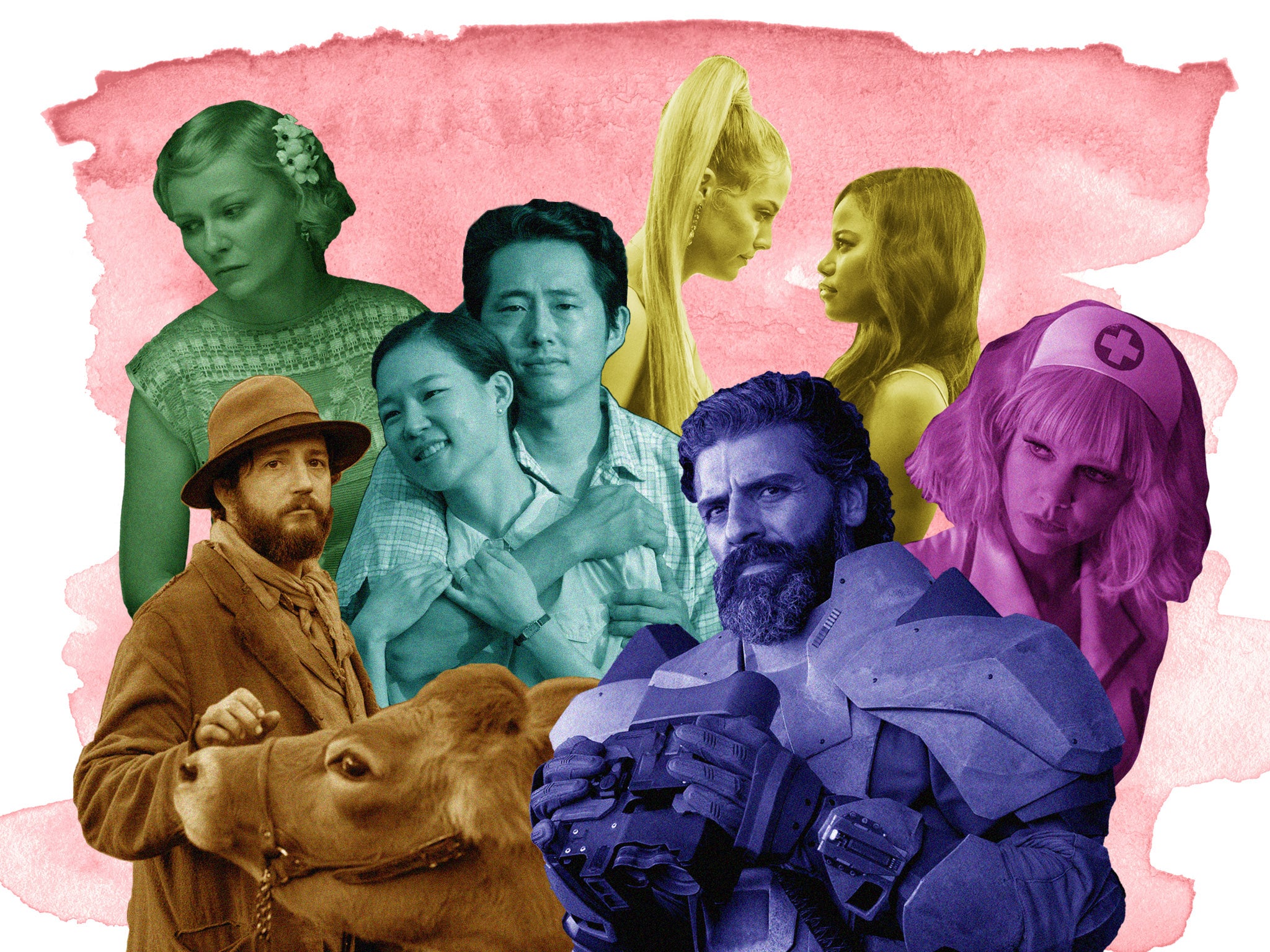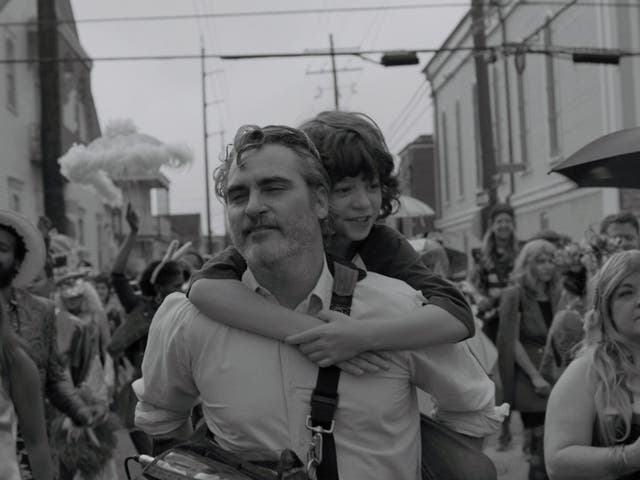The 10 best films of 2021, from Dune to The Power of the Dog
As a difficult year draws to a close with the future of cinema in doubt, films have remained as beautiful and challenging as ever. The Independent’s chief film critic Clarisse Loughrey counts down the 10 best


Your support helps us to tell the story
From reproductive rights to climate change to Big Tech, The Independent is on the ground when the story is developing. Whether it's investigating the financials of Elon Musk's pro-Trump PAC or producing our latest documentary, 'The A Word', which shines a light on the American women fighting for reproductive rights, we know how important it is to parse out the facts from the messaging.
At such a critical moment in US history, we need reporters on the ground. Your donation allows us to keep sending journalists to speak to both sides of the story.
The Independent is trusted by Americans across the entire political spectrum. And unlike many other quality news outlets, we choose not to lock Americans out of our reporting and analysis with paywalls. We believe quality journalism should be available to everyone, paid for by those who can afford it.
Your support makes all the difference.We’ve reached the end of 2021 – and the film industry is teetering on the precipice of an unknown future. When cinemas first reopened in the UK, back in May of this year, a survey found that only 40 per cent of audiences felt ready to return. Slowly and steadily, that number has grown, with the release of No Time to Die, Venom: Let There be Carnage, and Dune positioning October as the best-performing month of the year so far.
But “back to normal” is still a long way away and the box-office failures of original films like Last Night in Soho, King Richard, and The Last Duel have only created more uncertainty. All the past year has really done is bring us back to the one question that haunts all of modern cinema: is there any more room for adult-orientated, non-franchise fare, among all the multiplexes and billion-dollar event films?
We are never in any shortage of great films – the ones that shape, challenge, and move us – but it’s also far too easy for things to slip through the cracks. They get lost in the streaming service algorithms; they wither away in limited cinematic releases. But that brings me to this list: a collection of 10 films – big or small, fiction or non-fiction – that I’ve fallen in love with from the past year. Maybe you feel the same about them. Maybe they’ll encourage you to discover something new. But let it mostly serve as a reminder that, despite all the struggles of the last year, the one thing this industry doesn’t lack is imagination.
10) Zola
“You wanna hear a story about why me & this bitch here fell out? It’s kind of long but full of suspense.” Based on a series of tweets posted by exotic dancer A’Ziah “Zola” King in 2015, about a chaotic trip to Tampa with a woman she’d only just met, Janicza Bravo’s film is one hell of a ride. But it’s equally well-versed in the new bifurcated state brought on by social media – one where life isn’t just something to be experienced but to be observed so that it can later be regurgitated for a hungry, ever-present audience.
Zola (Taylour Paige) will sometimes direct punchlines into the camera (“They start f***ing. It was gross”). At other times, we’ll glimpse her in the corner of a frame, her arms spread across her body as a shield. That’s the other Zola – the more truthful, vulnerable one. There’s a microscopic precision to Paige’s performance, where monologues are spoken through the arch of an eyebrow or a single, toneless response of “word”. She’s surrounded by characters – played by Riley Keough, Colman Domingo, and Nicholas Braun – that feel both unbelievable and unnervingly recognisable, even as they act out against a backdrop of penis montages and singalongs to Migos’s “Hannah Montana”. As Zola argues, that’s where all the best stories lie.
Read the review here
9) Promising Young Woman
Promising Young Woman was never what its marketing campaign wanted to sell – its posters emblazoned with smeared lipstick and the tagline “take her home and take your chances”. Sure, Cassie (Carey Mulligan) has her nightly routine. She dresses up, goes out, looks drunk and vulnerable. When a man inevitably takes her home and tries to take advantage of her, she’ll suddenly snap out of her stupor and confront him with his own sins. But Cassie isn’t your average avenging angel. She doesn’t trace a line of blood and penance straight to the heart of the patriarchy.
Emerald Fennell’s film, this year’s winner of the Academy Award for Original Screenplay, is something far darker, thornier, and emotionally raw. Cassie isn’t just driven by a vengeful impulse – it’s an addiction that’s crawled out of an old wound. Years ago, at medical school, her best friend Nina was sexually assaulted. The man responsible, those who enabled him, and those who protected him, never faced consequences. Promising Young Woman has its surreal flair – all pumped full of pastels and portentous covers of pop hits – but its emotions are firmly rooted in our brutal reality. How exactly do the victimised find peace, Fennell asks? And how do the guilty pay for their actions?
Read the review here

8) Night of the Kings
Within the labyrinthian structures of La Maca penitentiary, on the outskirts of the Ivory Coast capital of Abidjan, a man (Bakary Koné) tells a story. And, much like Scheherazade, the heroine of One Thousand and One Nights, this story remains the one thing saving him from death’s embrace – his true role is to provide a distraction for the inmates so that a peaceful handover of leadership can take place. La Maca is ruled by its inmates and the Dangôro, their leader, is too sick now to fulfil his duties.
Though the framework of Philippe Lacôte’s film serves as its own testament to storytelling’s power to shape history and thought, there’s an intense beauty to the way the man’s words plunge his (and Lacôte’s) audience into the realm of fables. Dance, ritual, song, politics – all these elements combine in a series of reenactments that blur the line between truth and magic. The film features a cast of over 40 performers, many of them non-professional actors – among them feminist arist Laetitia Ky, sporting one of her regal, delicate hair sculptures. All the while, cinematographer Tobie Marier-Robitaille’s camera snakes around them, under their spell.

Watch Apple TV+ free for 7 days
New subscribers only. £8.99/mo. after free trial. Plan auto-renews until cancelled

Watch Apple TV+ free for 7 days
New subscribers only. £8.99/mo. after free trial. Plan auto-renews until cancelled
7) Gunda
Gunda is a stealth porcine soap opera – a documentary about farm life that not only beautifully renders such humble surroundings, but excavates a surprising amount of drama from all the daily toing and froing. Russia’s Viktor Kossakovsky begins with a litter of piglets and, as they grow, so their personalities and internal hierarchy mature. His camera stays ever-present at their eye level and limits itself to the boundaries of their world. The presence of humans is felt purely through their products of their industry – wire fences, ear tags, and tractors. Only in a single shot do we perceive the shadow of a boot. It’s an alien but joyous and deeply transportive experience.
In one sudden, emotionally (though not literally) violent sequence, we are reminded of the system these lives are bound to, as Kossakovsky’s environmentalist message quietly steps to the fore. Actor and activist Joaquin Phoenix executive produced the film for good reason. Though it never passes judgement on the viewer, nor sets forth any kind of demands, the film lends a necessary moral weight to the cycles of birth and death that mankind has placed under its control.
Read the review here

C’mon C’mon is a great big bear hug wrapped in celluloid. Johnny, played by Joaquin Phoenix, is a radio journalist who’s very good at asking questions but not so good at answering them. He and his sister Viv (Gaby Hoffmann) have drifted apart in the months since their mother’s death, but he now finds himself temporary parent to her son Jesse (Woody Norman) after she’s called away to help her estranged husband seek psychiatric help. Jesse is a curious boy, with a wavy helmet of hair and keen, dark eyes.
Mike Mills, the film’s writer and director, has long-understood how disarming intimate, unforced emotion can be. When Jesse asks Johnny the kind of questions that seem easy for the young – “Why aren’t you married?” – the responses come back all jumbled. Phoenix is at his best here, playful and vulnerable, while cinematographer Robbie Ryan uses a rich black and white that evokes the street photography of Lee Friedlander – both familiar and a little magical. It’s not that life gets harder, C’mon C’mon seems to argue, but that every year brings with it a little less clarity.
Read the review here
5) Dune
Already, Dune appears to have achieved its mission – its box office success has brought with it a spike in sales of Frank Herbert’s 1965 novel, reinvigorating its legacy in the same way Peter Jackson’s Lord of the Rings trilogy did for JRR Tolkien’s work. Herbert’s story of feudal nobles waging war over Arrakis, the only source of a powerful drug known as spice, is thick with conflicting ideas that academics are still unpacking today. For Villeneuve, his interests seem to lie mostly in where colonialism and religion collide, specifically in the weaponisation of belief in order to control a population.
Villeneuve allows the terrible, suffocating weight of destiny that infects its protagonist – the young noble Paul Atreides, on a path to become the all-knowing Kwisatz Haderach – to seep into every frame. It’s there in the sterile, muted palette of Paul’s homeworld Caladan and the gold-flecked haze of Arrakis. Figures traverse across vast landscapes, while miniature swarms of spaceships gather like invading insects. Villeneuve has created a film of such literal and emotional largeness that it overwhelms the senses.
Read the review here
4) Minari
This year, the Golden Globes hit a new low when it disqualified the beautiful and tender Minari from the Best Picture (Drama) race. Since its central, immigrant family often converse in Korean, it was treated purely as a foreign language film, despite being directed by an American (Lee Isaac Chung), produced by American companies, and set in the state of Arkansas. Minari is, in fact, a profoundly American film that wrestles with the country’s folkloric image of itself as a promised land – or, as the film’s patriarch Jacob Yi (Steven Yeun) calls it, a “garden of Eden”.
Jacob has become possessed by an idea: he’s moved his family from California to the rural south, where he hopes to grow the kinds of vegetables his fellow Korean-Americans have such a hard time getting their hands on. And so the Yis – Jacob, his wife Monica (Han Ye-ri), and their two children – say farewell to relative stability, with its regular work and tight-knit community. Chung’s film, set in the Eighties, has the gentle, hazy energy of a memory. An immigrant’s heart is a battleground between past and present, a home that once was and a home that is now. And Minari allows those ideas to manifest in a world of signs and symbols, the very building blocks of the American myth.
Read the review here

3) Nomadland
In her acceptance speech for Best Director, Chloé Zhao picked out a phrase from the Chinese text the Three Character Classic: “People, at birth, are inherently good.” Nomadland’s own fragile, humanist beauty lies in her steadfast belief that community can be a balm for all ills. Drawing from Jessica Bruder’s 2017 book Nomadland: Surviving America in the Twenty-First Century, the film features several of the real-life individuals mentioned in the book – older Americans who’ve adopted a transient lifestyle, living in campervans and trailers while they search for seasonal work. But Zhao never toys with their pain. Instead, she wraps this world around her audience like it’s a blanket, welcoming them through the familiar features of its A-list star, Frances McDormand.
Nomadland is so unlike the Best Picture winners we’re accustomed to. It’s quiet, where others have been boastful. It prefers simple looks or words to monologues. Where transformation does occur, it’s internal and not through some parade of wigs and prosthetics. With her third film, Zhao has established herself as one of our greatest practitioners of docufiction – she finds the cinematic that exists already within everyday life, rather than transforming the everyday until she deems it worthy of her camera.
Read the review here
2) The Power of the Dog
Jane Campion’s magnificent and erotically charged western, adapted from the Thomas Savage novel of the same name, is set against the craggy lines of the Montana mountains. Campion, however, chose to use her native New Zealand as a stand-in for the States. The fairytale beauty of that country lends a strange, inscrutable quality to the landscape, which lifts the entire film to a level of constant, heightened emotion. When the film’s newlywed couple, George (Jesse Plemons) and Rose (Kristen Dunst), find a quiet moment to embrace, the image of those two lovers, melted into one, feels as beautiful as it is ephemeral. The mountains that fold around and protect them could, at any moment, turn sharp, hostile, and dangerous.
But when George’s brother Phil (Benedict Cumberbatch, phenomenally vulnerable) walks through that same landscape, the entire place seems to rise up in retaliatory attack. His only impulse is to dominate and control those around – whether that be George, Rose, or Rose’s son Peter (Kodi Smit-McPhee), whose delicate eye for paper flowers and small creatures hides multitudes. Campion has an innate ability to express the texture of desire, whether it lives in the earth, in an embroidered handkerchief, or a braided leather rope. She can find the exact point when it curdles and turns into violence, or where it’s cultivated and allowed to blossom.
Read the review here
1) First Cow
Meek’s Cutoff, and now First Cow – Kelly Reichardt’s two bold, perceptive portraits of early America – should be treated as a new standard in historical filmmaking. Her ideas about the period are firmly and passionately rooted in a disdain for colonisation and oppression, while cleverly mocking the cultural myth that there was ever a west to be tamed or to be won. And in First Cow, all of it comes packaged in the form of a single bovine – the first to arrive in the disrupted Oregon country, now the prized possession of a local landowner (Toby Jones). Her milk is the tainted promise of a better future – siphoned off by the bucketful on a nightly basis by two frontiersmen, Cookie (John Magaro) and King-Lu (Orion Lee), who use it to make delicious oily cakes to sell to the community. But for Reichardt’s audience, all hope is short-lived when they’re reminded that the film opened with a shot of two skeletons, lying side by side.
But Reichardt’s never been a cynic. The profound sweetness of First Cow comes from the small details she builds into Cookie and Lu’s friendship. The pair fall into a kind of private, domestic bliss – a haven within an angry, ruthless world. Cookie bakes, while Lu chops wood. Magaro and Lee’s performances so sincerely connect to each other that to hear them talk is to feel invited into their world. First Cow begins with a quote from William Blake: “The bird a nest, the spider a web, man friendship.” America may not have been their home, but they still found one in each other.
Read the review here
For more end-of-year roundups, find The Independent’s favourite albums of 2021 here, and its top TV shows of the year here.



Join our commenting forum
Join thought-provoking conversations, follow other Independent readers and see their replies
Comments